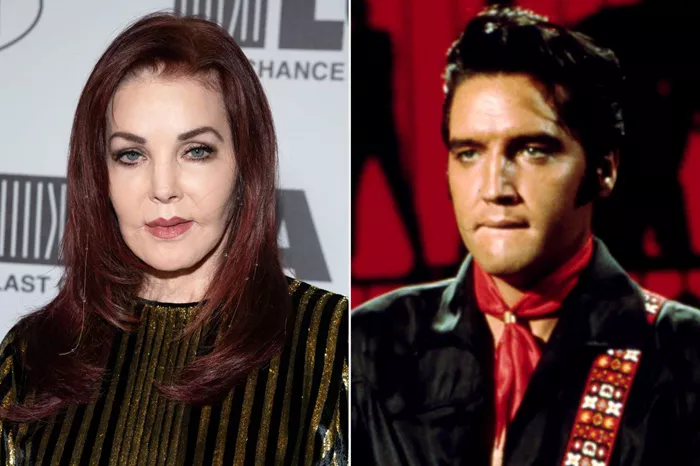Priscilla Presley, now 79, recalls the electrifying moment she first witnessed Elvis Presley perform live during the taping of his legendary ’68 Comeback Special. This pivotal event, which aired on NBC on December 3, 1968, marked a significant turning point in Elvis’s career and was a moment of profound personal significance for Priscilla.
Reflecting on that unforgettable experience, Priscilla shares, “You see all the girls lined up, all the fans going nuts, and I’m looking at this going, ‘Wow.’” She vividly remembers the excitement in the air as Elvis interacted with his adoring fans, even tossing his scarf to them, inciting wild enthusiasm. “It was really a treat. It was a trip, a great trip,” she adds.
The taping of the special came at a crucial juncture in Elvis’s career, as explored in Netflix’s new documentary Return of the King: The Fall and Rise of Elvis Presley, which premiered on November 13. Priscilla reveals that despite his larger-than-life persona, Elvis was nervous about performing again after such a long hiatus. “He hadn’t appeared [on stage] in so long,” she explains. “People would think, ‘How could he be nervous? He’s Elvis Presley.’ He was very nervous, but he did his homework. He would go and rehearse and rehearse and rehearse.”
Prior to this landmark performance, Elvis had not graced a live audience for seven years. His absence from the stage was largely due to his military service; he was drafted into the Army in 1957 and spent part of his service in Germany, where he first met a young Priscilla when she was just 14 years old.
After returning from the Army in 1960, Elvis found himself trapped in a multi-year movie contract orchestrated by his manager, Colonel Tom Parker. Frustrated with the lackluster scripts he was being offered, Elvis longed for more meaningful artistic opportunities. “One day he was reading a script and he threw it across the room and said, ‘I’m not doing this,’” recalls Jerry Schilling, a longtime friend of Elvis. “The Colonel loved Elvis and vice versa, but Elvis outgrew the Colonel.”
Priscilla empathizes with Elvis’s artistic frustrations. “He wanted to be in great movies, not the stupid movies that he did like Girls! Girls! Girls! That wasn’t Elvis,” she says. She highlights that Colonel Parker’s vision for Elvis did not align with his true artistic aspirations. “Colonel did not get him really at all,” she adds. “That was hard for both Jerry and I, but you couldn’t say anything to Colonel. You just had to keep quiet.”
In one poignant scene from the documentary, Priscilla watches footage of Elvis performing “Old MacDonald Had a Farm” in the 1967 film Double Trouble. Her reaction is visceral: “That, to me, is a crime,” she states emphatically. “To put him in that situation and sing that song. It made him a laughingstock. And he knew it.”
Despite Parker’s attempts to steer Elvis towards family-friendly projects—such as a Christmas special—Elvis remained resolute in his desire to return to his rock roots. As Schilling explains, “The Colonel came from the old school where he wanted Elvis to be Bing Crosby doing a Christmas Special rather than doing a sexy rock and roll gospel like the ’68 special.”
The ’68 Comeback Special ultimately became one of NBC’s highest-rated shows that year—a surprising outcome for Elvis himself. Schilling recounts how Elvis initially had no idea how the public would receive the performance. “It wasn’t until we saw it live on television with the rest of America that he realized it was good,” Schilling notes. As phone calls from friends and industry insiders began pouring in after the broadcast, it became clear to Elvis that he had successfully reconnected with his audience. “He was beaming at that point,” Schilling recalls.
This triumphant return to live performance reinvigorated Elvis’s career; he went on to perform hundreds of concerts before his untimely death at age 42 in 1977. Schilling reflects on their friendship and loss: “I feel strongly I lost my friend at an early age out of creative disappointment. I know I did,” he says. He believes this creative dissatisfaction contributed to other struggles within Elvis’s life but acknowledges that challenges like the ’68 Special motivated him to push himself artistically—often leading him to undergo rigorous training akin to an athlete preparing for competition.
With Return of the King, Priscilla hopes to educate younger generations about her late husband’s legacy and why he earned the title “King of Rock ‘n’ Roll.” She emphasizes her desire for today’s youth to understand not just his music but also his profound influence on popular culture.
Read more:


